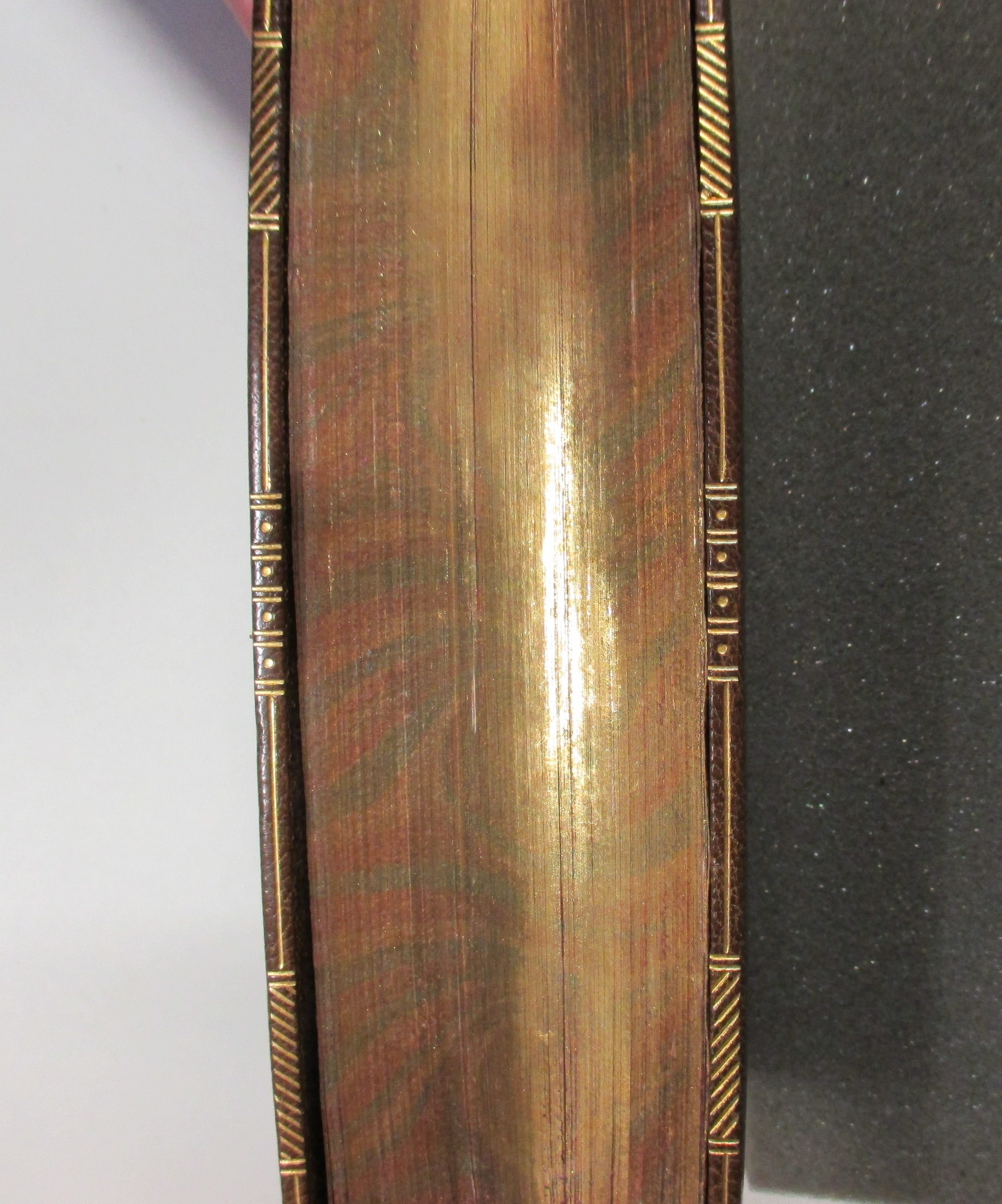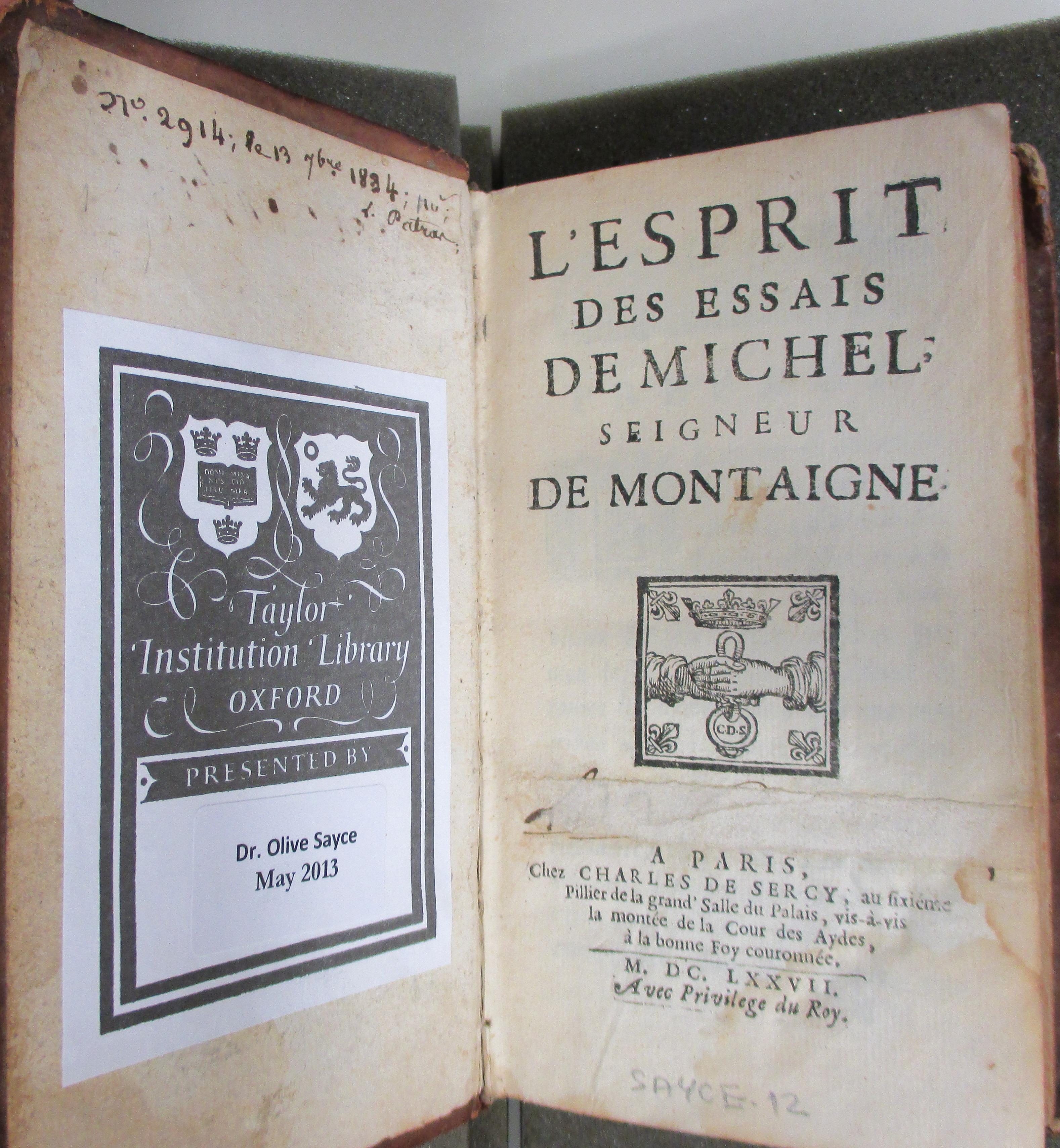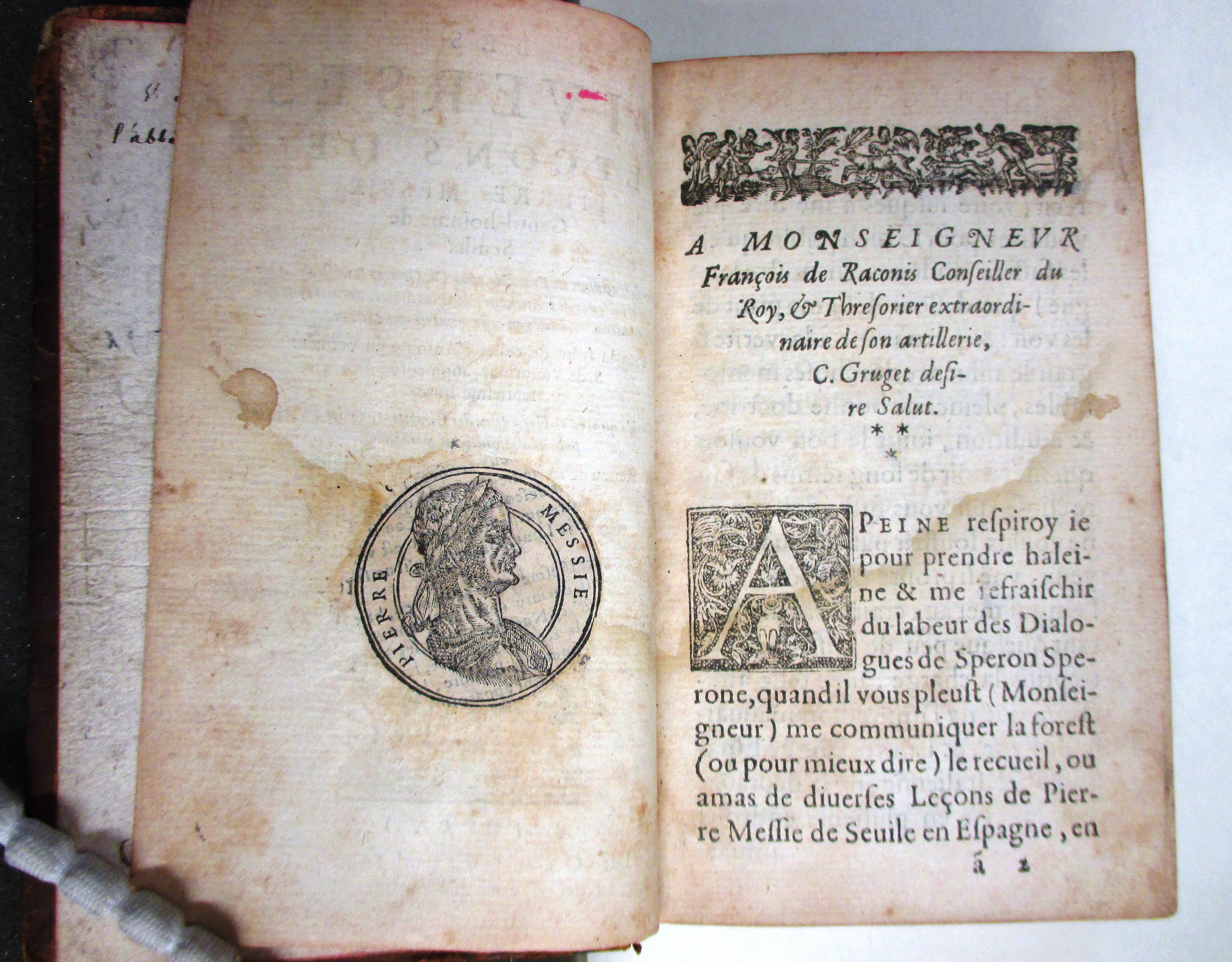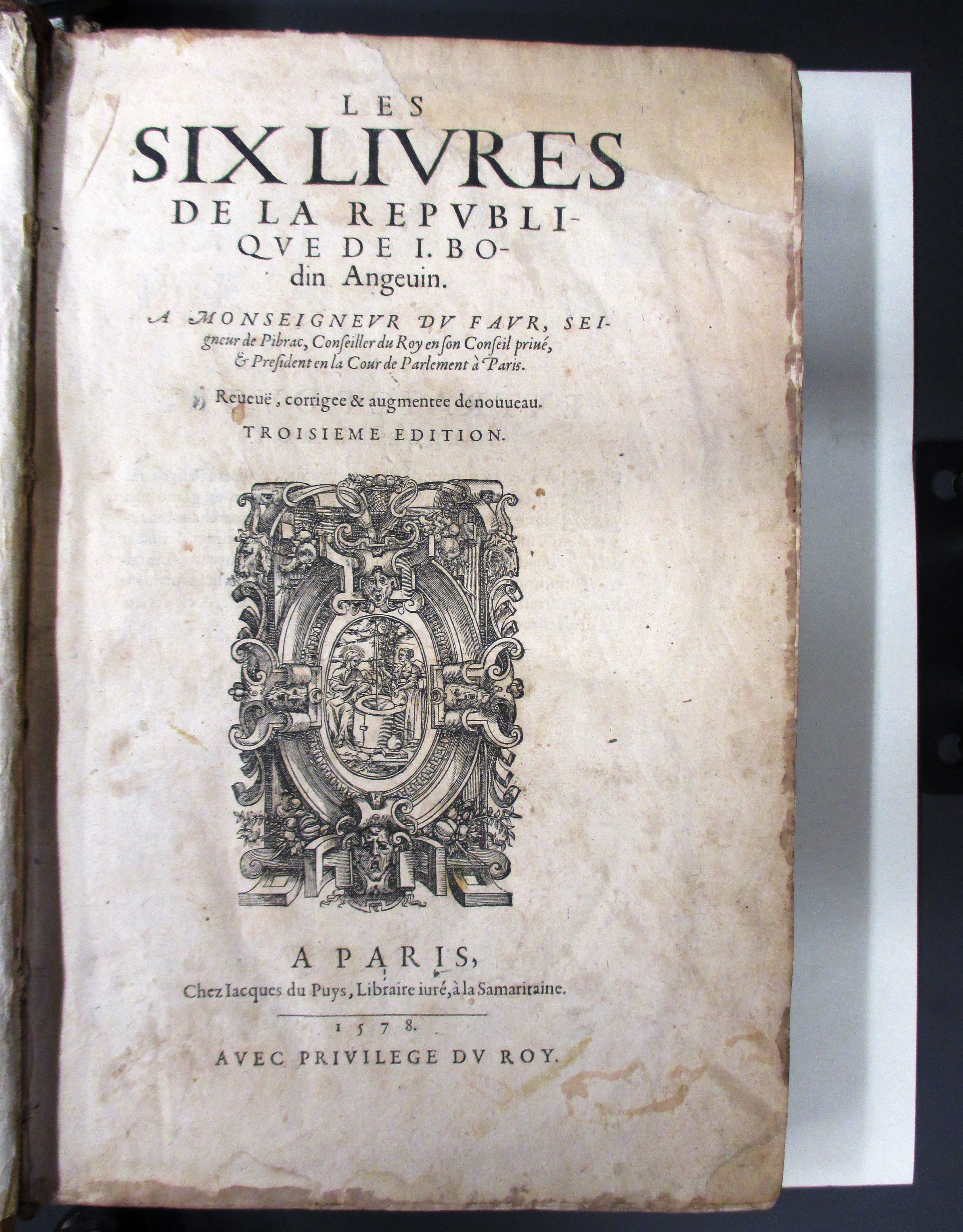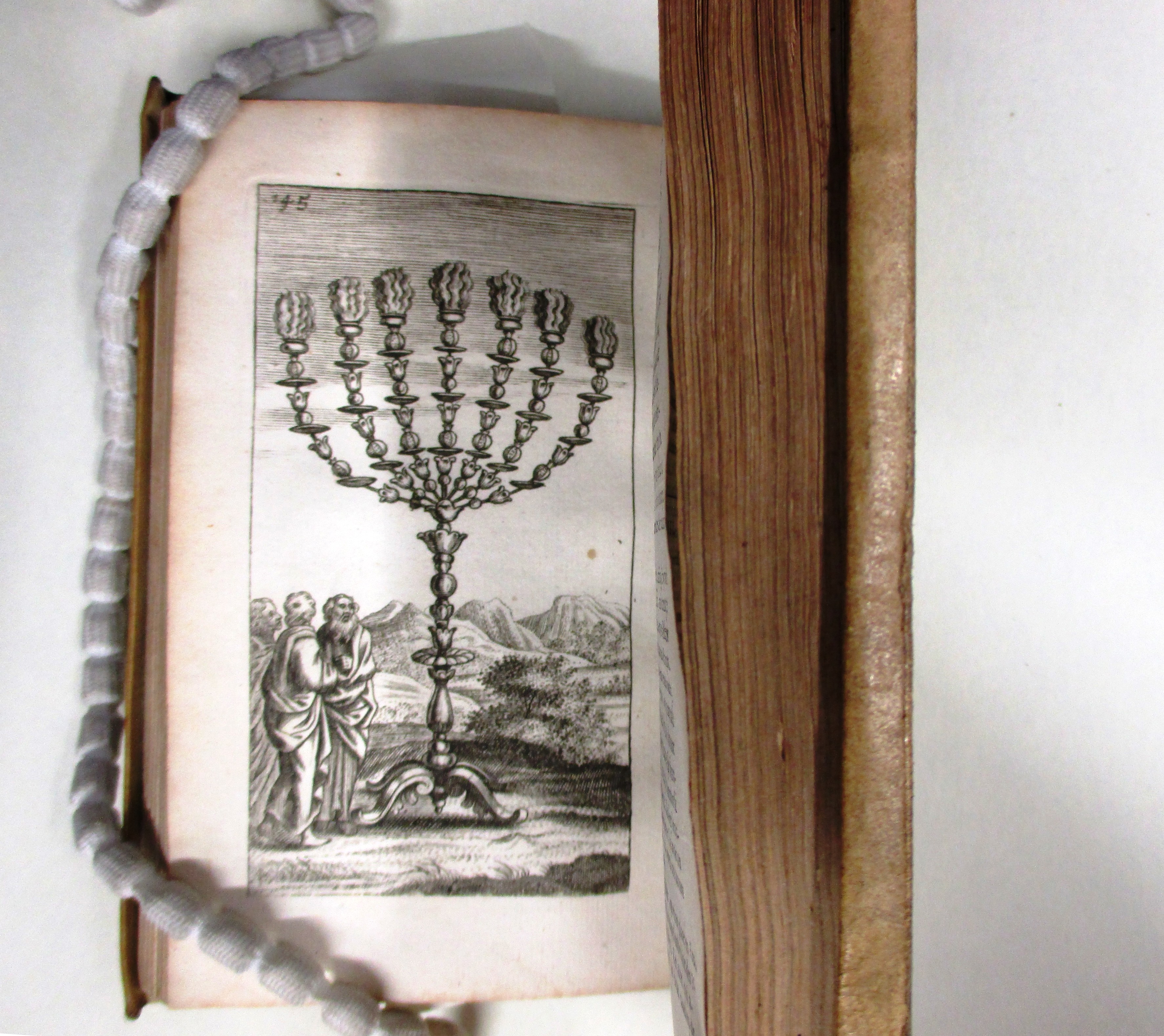- Michel de Montaigne (Presumed portrait by an anonymous 16th/17thC artist) (Chantilly, Musée Condé, inv. PE 253. Image source: LibraryThing)
- Decorated end-paper. Montaigne, Michel de. Les essais de Michel Seigneur de montaigne (1619. SAYCE 93)
- Gilded edges. Montaigne, Michel de. Les essais de Michel Seigneur de montaigne (1619. SAYCE 93)
February 28th was the the birthday of the French writer Michel de Montaigne (1533-1592) and so now is a good time to consider a collection of books which The Taylor Institution Library received not so long ago – the Sayce bequest. Back in the summer of 2013 the Taylor Institution Library received a collection of 285 rare books (mainly French but some in other languages) from the personal collection of the scholar and Oxford don, Dr Richard Sayce, after the death of his wife, Olive Sayce, in March 2013.
Richard Sayce (1917-1977) taught at Oxford since 1947. He became a Fellow of Worcester College in 1950 and Fellow Librarian of Worcester College in 1958. He would hold these posts right up to his death at the relatively young age of 60. He is mostly remembered as a Montaigne scholar and this academic focus is reflected in this collection of books. He compiled a comprehensive bibliography of early editions of Montaigne, completed after his death by David Maskell: A descriptive bibliography of Montaigne’s Essais, 1580-1700 (Oxford, 1983).
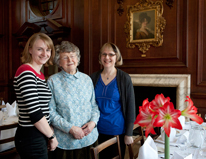 His wife, Olive Sayce, another Oxford scholar but who specialised in German medieval poetry, wrote a touching memorial of her husband’s life. R.A. Sayce, 1917-1977: a memoir (Oxford, 1983) recounts his early life on the Welsh Borders (the name Sayce derives from ‘Sassanach’), his travels during the Second World War (in the course of which he found India ‘too hot’ but found Persia more congenial even to the extent of learning Persian), how they met – in the Senior Staff Room of the Taylor Institution (‘not one of the most romantic places!’).
His wife, Olive Sayce, another Oxford scholar but who specialised in German medieval poetry, wrote a touching memorial of her husband’s life. R.A. Sayce, 1917-1977: a memoir (Oxford, 1983) recounts his early life on the Welsh Borders (the name Sayce derives from ‘Sassanach’), his travels during the Second World War (in the course of which he found India ‘too hot’ but found Persia more congenial even to the extent of learning Persian), how they met – in the Senior Staff Room of the Taylor Institution (‘not one of the most romantic places!’).
There are about 285 books in Richard Sayce’s antiquarian collection. Fourteen of them were published in the 16th century, 128 in the 17th century, 123 in the 18th century and the rest in the 19th and 20th centuries. Like many of the scholars’ collections which have come to the Taylor Institution Library it is very much an intentional collection. Each book purchase was a deliberate act and the collection as a whole not only reflects the personality and interests of the man who collected it but also the man at the centre of the collection – Michel de Montaigne.
Richard Sayce was a man who loved and valued books. Olive Sayce records that he made one of his last book purchases shortly before his death. At the centre of the collection are works by and relating to Montaigne. There is an early edition of Montaigne’s Essais published in Lyons in 1593 (SAYCE.8).
- Selection of early editions of Montaigne’s Essais
- Montaigne, Michele de. Livre des essais de Michel seigneur de Montaigne (1593. SAYCE.8)
- Bookplate. Montaigne, Michele de. Livre des essais de Michel seigneur de Montaigne (1593. SAYCE.8)
This was the next edition to be published after the edition of 1588 – one of the copies of which was personally annotated by Montaigne himself and is known as the ‘Bordeaux edition’. The Taylorian already had the second volume of this 1593 edition in our Special Collections (containing Book III of the Essais) so it is good that we now have a complete set.
After that edition the Sayce Collection contains editions published in 1600, 1602, 1604, 1608, 1617, 1619, 1640, 1649, 1652, 1669, 1677, 1695, 1724, 1725, 1754 and 1776 – many of them recorded among other editions in A descriptive bibliography of Montaigne’s Essais, 1580-1700.
- Montaigne, Michel de. Les Essais de Michel Seigneur de Montaigne (1617. SAYCE.92)
- Montaigne, Michel de. L’esprit des Essais de Michel, Seigneur de Montaigne (1677. SAYCE.105)
Richard Sayce’s own copies are recorded in the card-indexes in the archive in Worcester College with his initials RAS. It is interesting that the 1695 edition of the Essais in the Sayce collection does not appear to be recorded in the bibliography. It is also perhaps unfortunate that the bibliography ends with the year 1700 as there are a number of 18th century editions of Montaigne that also deserve to be recorded in a bibliography. Scope for a sequel, perhaps?
Montaigne’s Essais are his personal reflections on different aspects of human life. They are based on his own experience and thinking. They are down-to-earth and full of common-sense, making use of many quotations and a vigorous and vivid style. Whatever the subject they always come back to one man’s personal experience – that of Montaigne himself. Montaigne discusses himself with an objectivity and honesty which is surprising and revealing and also the very method of the Essais. The Essais contain many allusions and quotations from the classics, some of them from books contained in the Sayce collection such as Plutarch, Seneca, Cicero, Tacitus etc. Latin authors are quoted in the original Latin. Some of these works are to be found in the Sayce Collection in early editions. The ideas contained within the quotations are then refracted through Montaigne’s own mind and experience to reveal much that is new and original. As we read the Essais we have a remarkable sense of getting to know Montaigne as a person – as a wise friend.
Montaigne himself had a library of some 1000 books and this would have been considered a large collection at the time. Only about 101 books survive. Pierre Villey, in his Les sources et l’évolution des essais de Montaigne, listed 271 books which are known to have belonged to Montaigne. How many of those 271 books are represented in the Sayce Collection? Certain of the major works are there (although not the actual copies and probably not the actual editions which Montaigne owned). The Sayce collection boasts early editions of Plutarch’s Vie des hommes illustres t.1-2 (1565) (SAYCE.9-10) and Les morales de Plutarque (1575 and 1594) (SAYCE 11-12) both of which were in Montaigne’s library, according to Villey. Montaigne mentions having Plutarch in the French in one of his essays and this would have been the Amyot translation which we also have in the Sayce Collection. Some of these could have been the actual editions which Montaigne owned but we do not know this. Montaigne owned a copy of Gellis’s Circe and an early edition of this can be found in the Sayce Collection (1600) (SAYCE.61). Les diverses leçons de Pierre Mexia, owned by Montaigne, is also present in the Sayce Collection (1616) (SAYCE.87).
- Mexia, Pedro. Les diverses leçons de Pierre Messie Gentil-homme de Sevile: Mise de castillian en françois, par Cl. Gruget parisien (1616. SAYCE.87)
- Mexia, Pedro. Les diverses leçons de Pierre Messie Gentil-homme de Sevile: Mise de castillian en françois, par Cl. Gruget parisien (1616. SAYCE.87)
Editions of Caro’s De le lettere familiari del Commendatore Annibal Caro (SAYCE.4) (1591) are in both collections.
The historian Jean Bodin is represented in Montaigne’s library by J. Bodini methodus ad facilem historiarum cognitionem while in Sayce’s collection there is a translation Les livres de la république de I. Bodin (1578 (3rd ed.) (SAYCE.3(OS)).
The History of the Jews by Josephus Flaviuswas present in Montaigne’s library and a later edition (1676) is in the Sayce Collection (SAYCE.64-69b) .
- Josephus, Flavius. Historie des Juifs, v. 1 (1676. SAYCE.66)
- Josephus, Flavius. Historie des Juifs, v. 1 (1676. SAYCE.66)
However, to see a library which actually contains 10 volumes from Montaigne’s original personal library and many more books which would have been likely to have been in his library you will need to go to Cambridge to the Montaigne Library assembled by the scholar and financier Gilbert de Botton. Recreating Montaigne’s library was not the main aim of the Sayce collection which aims above all at placing Montaigne in context as well as following up Sayce’s own interests.
 One of the travel books in the collection (and travel books are a feature of the Sayce collection) is the one describing a journey which Montaigne undertook to Italy: Journal du voyage de Michel de Montaigne en Italie : par la Suisse & l’Allemagne en 1580 & 1581. The manuscript of this travel journal was only discovered in 1770 in the Château de Montaigne 178 years after his death. The main purpose of the journey was for Montaigne to cure the pain of his kidney stone at thermal resorts. One of Richard Sayce’s final projects had been to undertake Montaigne’s journey afresh (in a car rather than a carriage), visiting all the places which Montaigne had visited. The photographs that he took of this recreated journey are in the Worcester College archive. Sayce’s two 1774 editions of this work in the collection must be among the earliest editions of the jorunal.
One of the travel books in the collection (and travel books are a feature of the Sayce collection) is the one describing a journey which Montaigne undertook to Italy: Journal du voyage de Michel de Montaigne en Italie : par la Suisse & l’Allemagne en 1580 & 1581. The manuscript of this travel journal was only discovered in 1770 in the Château de Montaigne 178 years after his death. The main purpose of the journey was for Montaigne to cure the pain of his kidney stone at thermal resorts. One of Richard Sayce’s final projects had been to undertake Montaigne’s journey afresh (in a car rather than a carriage), visiting all the places which Montaigne had visited. The photographs that he took of this recreated journey are in the Worcester College archive. Sayce’s two 1774 editions of this work in the collection must be among the earliest editions of the jorunal.
The items in the collection closely related to Montaigne include his translation of Theologia Naturalis by Raymond of Sabunde (1385-1436). We have two editions of Montaigne’s translation: (1611) (SAYCE.120) and (1640) (SAYCE.121). Montaigne’s father asked Montaigne to translate this work and the first edition of the translation was published in 1568, one year after his father’s death. One of Montaigne’s essays is entitled ‘Apologie de Raymond Sebond’. The work argues for the possibility of the revelation of divine truth through nature as well as the Bible. It is above all the natural and the spontaneous which come through in the Essais with their characteristic digressions.
- Raymond, Sabunde. La théologie naturelle de Raymond Sebon (1611. SAYCE.120)
- Raymond, Sabunde. La théologie naturelle de Raymond Sebon (1640. SAYCE.121)
There is a wealth of other books in the Sayce collection – many of them related in one way or another to Montaigne and his times and others of them reflecting Sayce’s own interests but we will leave discussion of them to a later blog. If you feel like commemorating Montaigne’s birthday by reading something by or about Montaigne and/or Richard Sayce, here is a short list to enable you to do so.
Nicholas Hearn, Subject Consultant for French Literature and Language
SELECT BIBLIOGRAPHY:
Bakewell, Sarah How to live,or, A life of Montaigne in one question and twenty attempts at an answer (London, 2011)
Bodin, Jean Les six livres de la république (1578) (SAYCE.3(OS))
Caro, Annibal De le lettere familiari del Commendatore Annibal Caro (SAYCE.4)
Ford, Philip The Montaigne library of Gilbert de Botton at Cambridge University Library (Cambridge, 2008)
Gelli, Giovanni La Circe (1600) (SAYCE.61)
Maskell, David A descriptive bibliography of Montaigne’s Essais, 1580-1700 (Oxford, 1983)
Mexia, Pedro Les diverses leçons (1616) (SAYCE.87)
Montaigne, Michel Essais (Lyons, 1593) (SAYCE.8)
Montaigne, Michel Journal du voyage en Italie (1774) (SAYCE.237-239)
Montaigne, Michel Journal du voyage en Italie (1774) (SAYCE.240-242)
Plutarch Vie des hommes illustres t.1-2 (1565) (SAYCE.9(OS))
Plutarch Les morales (1575) (SAYCE.11) (OS)
Plutarch Les morales (1594) (SAYCE.12)
Raymond of Sabund Theologia Naturalis (1611) (SAYCE.120)
Raymond of Sabund Theologia Naturalis (1640) (SAYCE.121)
Richard Sayce Archive (Worcester College)
Sayce, Olive R.A. Sayce, 1917-1977: a memoir (Oxford, 1983)
Villey, Pierre Les sources et l’évolution des essais de Montaigne (Paris, 1908)



